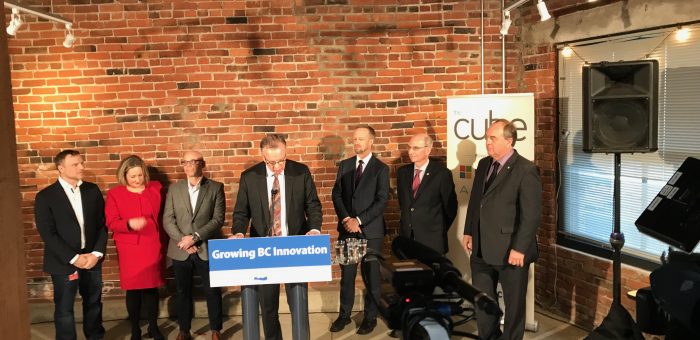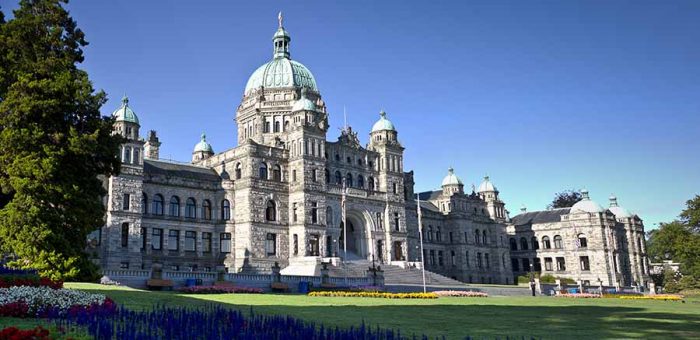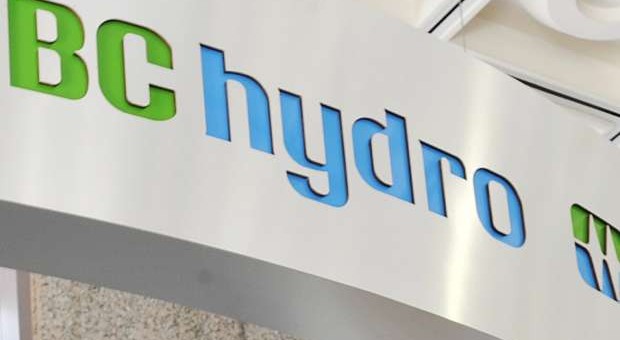Clean Technology
Continuing to explore government support for BC Tech and their Cube & Hub innovation centres in Vancouver
On April 11, the day before the legislature rose for a two week break, I stood during Question Period to ask the Minister of Minister of Jobs, Trade and Technology whether he was aware of the critical services and programs provided by BC Tech at the Cube and the Hub in Vancouver and the positive impact they have on our innovation community. In response, the Minister spoke passionately about the good work and leadership of the B.C. Tech Association. Yet just five days later, the BC Tech Association announced the impending closure of the Cube due to their inability to secure provincial (and federal) funding to enable it to remain open.
Today I rose during question period to ask the Minister how he reconciles his stated support for the tech sector with the fact that the BC Tech Association is being forced to close the doors of this facility. In addition, I asked the Minister why the Ontario tech sector was getting a $90 million investment the same week that the BC Tech sector was making its announcement. Below I reproduce the video and text of our exchange.
Video of Exchange
Question
A. Weaver: Hon. Speaker, if you or other members in the gallery thought that they were participating in an episode of The Twilight Zone, I share their concerns. Here we have the official opposition and their leader arguing for Marxist policy to bring in a price cap, and we have the leader of the socialist party arguing for free market economics. What has B.C. politics come to?
We now have a new level of standard for research by the official opposition. Oil apologist, gasbuddy.com, providing the official opposition official research on their efforts. I cannot wait till the next episode comes forward.
Two weeks ago I asked the minister if he was committed to ensuring that programs and services provided by the B.C. Tech Association at The Cube and The Hub were able to continue. In his response, the minister spoke about how The Cube had provided many opportunities and shown leadership in the sector.
However, since that time, The Cube has now announced it is closing its doors in May because it was unable to secure either provincial or federal funding. This closure sends a wrong signal — the exact wrong signal as to where we should be headed.
My question is to the Minister of Jobs, Trade and Technology. How can the minister reconcile his stated support for the tech sector with the fact that the B.C. Tech Association is being forced to close the doors of The Cube facility?
Answer
Hon. B. Ralston: I would like to thank the Leader of the Third Party for his question and for his continuing support for the tech sector. It’s a growing, vibrant sector here in our province.
We spoke last time about The Cube, and The Cube’s source of funding came from the federal government, from the western diversification fund. They decided to discontinue that funding. As part of the transition, our government gave them $500,000 to point themselves in a new direction. That did not result in their ability to continue it.
But at the same time, in the same sector — the virtual reality, augmented reality sector — just on Tuesday, April 16, I was there…. Actually, Ms. Tipping, the head of the Technology Improvement Association, was there at the launch of a new incubator, the Launch Academy, in the very same sector, the VR-AR sector — very successful, couple of hundred companies there.
This is the biggest AR-VR sector in the world. Perhaps maybe second, although one would be permitted, as an advocate, a little bit of boasting, I think. That sector is world-leading. We are doing well.
The vibe at that place was really good. I spoke with Alex Cheong, cofounder of Shape Immersive. They are very enthusiastic about the possibilities.
This is a sector where there is change. Things change. The Cube didn’t work out. This sector is taking over. I’m very confident about that sector and its future here in British Columbia — indeed, its future globally.
Supplementary Question
Well, I, too, am excited about the prospects for tech in British Columbia. I’m profoundly concerned that B.C. is not stepping up to draw the federal dollars that are available that jurisdictions like Ontario have done. In fact, the same week that the Cube was being closed, the federal government announced in partnership with Ontario a $90 million investment in innovation in Ontario.
Both B.C. and Ontario have burgeoning innovation sectors that drive economic growth and create high-paying, good-quality jobs. The sectors in both provinces have huge potential for growth, and our sector has some of the best potential of all. It will help us transform our economy and drive prosperity for British Columbians from north to south and east to west.
The only difference is that in Ontario, they’re at the table and willing to invest substantially in this new, up-and-coming sector, whereas B.C. appears to be the absent. We’ll be left in the dust behind other jurisdictions if it doesn’t back up its words with actions to ensure that we’re there able to leverage those federal moneys to ensure that we get the innovation centres in B.C. that are so instrumental to the development of the new economy.
My question is again to the minister. Why is the Ontario tech sector getting $90 million as an investment the same week as the B.C. tech sector is being forced to close a facility for innovation in B.C.?
Answer
Hon. B. Ralston: I appreciate that the member is particularly enamored of the initiatives taken by the Ford government in Ontario. But the reality here in British Columbia is that we are investing a huge amount in the tech sector here.
Let’s begin with 2,900 new tech spaces in institutions across the province. We are investing $110 million in innovative research in B.C.’s leading post-secondary institutions through the B.C. Knowledge Development Fund. We are investing $12 million in graduate scholarships for students, including science- and tech-related disciplines, as well as $500,000 for women in tech scholarships.
We are making the commitments. Those commitments are going to be renewed through a new Innovate B.C., which has a fresh mandate, a new CEO who comes from Accelerate Okanagan. I’m very optimistic about the future of the tech sector and the investments that come not only from the start-up environment here, which is booming from global companies which are choosing to locate here. Jiu-jitsu was mentioned in the two-minute statements, and there are many others.
People want to be and tech companies want to be in British Columbia. They are coming here, and they will continue to come here because of what we have to offer.
Exploring government support for BC Tech and their Cube & Hub innovation centres in Vancouver
Today in Question Period I rose to ask the Minister of Jobs, Trade and Technology whether he was aware of the critical services and programs provided by BC Tech at the Cube and the Hub in Vancouver and the positive impact they have on our innovation community.
Below I reproduce the text and video of our exchange.
Video of Exchange
Question
A. Weaver: Hon. Speaker, I must say it is a kinder and gentler question period in the Legislature here today.
On that note, I will note that on February 5, 2018, the Minister of Jobs, Trade and Technology announced the appointment of B.C.’s first innovation commissioner. The announcement was at B.C. Tech’s Cube. This was widely celebrated as a significant step forward for innovation in our province. I was present at the announcement.
Just two weeks ago, at the B.C. Tech luncheon, the minister and I met some B.C. leaders in the tech sector. Companies that have grown and thrived thanks to the programs and services provided by the B.C. Tech Association.
My question is to the Minister of Jobs, Trade and Technology. Is the minister aware of the critical services and programs provided by B.C. Tech at the cube and the hub in Vancouver and the positive impact they have on our innovation community?
Answer
Hon. B. Ralston: I thank the member for the question. I too share his optimism about the growth of the technology sector here in British Columbia. Certainly the augmented and virtual reality sector, which the cube is a start-up laboratory for, is a very strong one. It’s a very strong sector — in fact, globally leading.
Since we have the ambassador for Korea here, on a recent trip with the Minister of State for Trade to Korea, we met with companies that are well aware of the opportunities here in British Columbia. In fact, there are exchanges, business exchanges, between the Giyungi Content Organization in the sister province to British Columbia and the sector here.
The B.C. Tech Association has provided leadership in that sector, I’m well aware of the opportunities that the cube has provided. Indeed, our government, in December, provided the sum of $500,000 to assist them in preparing as they move to a new funding model.
The initial funding for the cube came largely from the federal government, from the western diversification fund. They underwent a review of their funding of these incubators and have decided that they are heading in a different direction. So as the organization works out its approach, we have provided that money to assist the transition.
Supplementary Question
A. Weaver: Thank you for that very, very comprehensive answer.
The programs and services provided by B.C. Tech help people to take their ideas and turn them into companies. They help existing companies bridge what’s commonly known as the “valley of death.” That is, they help them manage the hyper-growth that these companies often encounter.
Programs and services are an essential engine for innovative growth in our economy, and they rely upon government and industry funding to be able to continue. But in the absence of provincial funding, these programs could be at risk.
Once again, my question is for the Minister of Jobs, Trade and Technology. Supporting innovation in our economy is a critical priority for the B.C. Green caucus.
Is the minister equally committed to ensuring the programs and services provided by the B.C. Tech Association at The Cube and the Hub are able to continue?
Interjections.
Answer
Hon. B. Ralston: I wish the answer were that simple.
The member has referenced the appointment of the innovation commissioner. In a recent report to the Legislature, he set out what he thought were important directions for government policy in the future. He recommends an economic and technology strategy that supports increased business investment in research and development, developing talents at post-secondary institutions and scaling up small businesses with huge growth potential. He’s suggested three different kinds of clusters, whether they’re regional community clusters, emerging technology clusters or scale-up, market-driven clusters.
Certainly, the B.C. Technology Industry Association is a strong leader in providing policy advice to the government. I think they have adopted and would recommend very similar solutions to those that the innovation commissioner put forward, particularly in relation to scaling up companies, taking companies from the start-up environment and building big companies here that are global leaders. And there are lots of opportunities to do that, given the strength of our sector here.
I thank the member for giving me the opportunity to talk about those policies, and I look forward to developing those policies with all members of the Legislature in the future.
Progress towards creating 2900 new tech-related spaces in postsecondary institutions
Budget estimate debates for the Ministry of Advanced Education were held yesterday. I took the opportunity to ask the Minister about government’s progress towards creating the promised 2,900 additional tech-related spaces in public post-secondary institutions. This was supposed to result in 1,000 additional grads per year by 2023.
Below I reproduce the text and video of the exchange. As you will see from the response, I am pleased that the government appears to be on track to reach this target.
Video of Exchange
Text of Exchange
A. Weaver: Thank you. I appreciate that.
The next question is with respect to the government announcements regarding the tech industry and the 2,900 additional tech-related spaces that the minister announced would be made available through public post-secondary institutions. This was supposed to result in 1,000 additional grads per year by 2023. Start-up funding was $4.4 million last year, but was expected to increase to $42 million.
I have two questions on this particular aspect. Is this plan still on track, number one? Two, how many spaces were added at B.C. post-secondary institutions last year?
Hon. M. Mark: Yes, the plan is on track. We began with 380 full-time-equivalent student spaces. We have a multi-year plan, to the member’s question. It started with an investment, as he noted, of $4.4 million to post-secondary institutions in 2017-2018. It increased to a total of $7 million in 2018-2019, and it continues to increase over the course of the new three-year fiscal plan. In 2019-2020, we plan to provide $24.9 million in funding, with further increases to come in subsequent years.
A. Weaver: Thank you to the minister for the answer. According to the CEO of the B.C. Tech Association, access to talent is the single greatest barrier to growth for B.C. tech companies and the industry as a whole. In fact, it’s got to such a state in British Columbia that there are companies acquiring other companies solely for the talent that the company actually holds.
I’m wondering whether or not government believes that the investments they’re making are adequate — what metrics are they using to determine whether or not they are adequate? — and whether or not they believe their goals are being reached.
Hon. M. Mark: I want to acknowledge the work of B.C. Tech. We’ve got the third annual tech summit coming up next week. We’ve got a huge delegation of young people that are going to come from across the province to participate in that forum.
It’s a continuation of previous work that was done by the former government. But we’re talking about three years. So when the member asks, “is this significant…?” It’s a start; 2,900 seats is a lot for this system. It’s the first lift in a decade.
We’re very, very proud of that. We also have to look at the system and their capacity — the availability of facilities, equipment and instructors. So we will continue to invest in tech spaces, and we’re going to continue to work with industry. For right now, we’re just very proud of this first step. There will be more.
Initial response to BC Budget 2019
Today was Budget Day in the BC Legislature. This is the second full budget announced by the BC NDP minority government. The government’s 2019 budget provides clear evidence that the B.C. Greens’ participation in this landmark minority government has been a success in advancing its values and policy priorities.
When I rise tomorrow to speak to the budget, I will provide a more extensive analysis. Below is the media statement we released outlining our initial reaction.
Media Statement
B.C. Green influence evident in 2019 budget priorities
For immediate release
February 19, 2019
VICTORIA, B.C. – The government’s 2019 budget provides clear evidence that the B.C. Greens’ participation in this landmark minority government has been a success in advancing its values and policy priorities.
“We are pleased the B.C. Green Caucus’ impact on this budget is so evident,” said MLA Andrew Weaver. “By funding core B.C. Green initiatives, including CleanBC, professional reliance reform, and increasing affordability for students, government demonstrates the value of our voice in a minority government.
“I have been pushing government to prioritize the wellbeing of British Columbians, their economy and their environment since I was elected almost six years ago. CleanBC is not just an investment for today, but for our future as well. The investment of almost $1 billion over the fiscal plan goes a long way to putting us on track to meet our targets.”
Advancing the policies in the Confidence and Supply Agreement has been a unique challenge, but the 2019 budget takes meaningful steps forward on numerous caucus priorities. The B.C. Green Caucus values being able to work collaboratively with government.
Other B.C. Green priorities that have been funded in this budget: support for family caregivers, Pharmacare, education, childcare, and investments in youth mental health.
The announcement of the B.C. Child Opportunity Benefit is also a positive step forward, providing support for the health and wellbeing of B.C. families.
“The B.C. Child Opportunity Benefit will positively impact B.C. families and aligns with our values of intergenerational equity and proactively promotes the health and wellbeing before they find themselves left behind.”
There are also welcome advances in the relationship between government and Indigenous nations with the agreement on revenue sharing advanced in this budget.
However, the B.C. Green caucus would have invested significantly more in environmental stewardship to ensure future generations have the same opportunities and security that we do.
“Funding for habitat and species protections is underwhelming. Our province’s wildlife is facing increasing threats, and to ignore the plight of endangered species like steelhead is more than shortsighted; it is dangerous to the economy, environment and our province’s cultural identify.
“Preparing for the future will continue to be a challenge. We know that climate change threatens every aspect of life in our province. Government must recognize this threat and allocate funding to address the unavoidable increase in natural disasters. From wildfires to flooding, we must aggressively fund our emergency response network and plan on emergency funding needs in the year to come.”
-30-
Media contact
Macon McGinley, Press Secretary
250-882-6187 |macon.mcginley@leg.bc.ca
Responding to the release of BC Hydro Phase 1 review
The BC NDP today released Phase 1 of its BC Hydro review. While the BC Green Caucus supports the reestablishment of the BC Utilities Commission’s oversight role for BC Hydro, we are profoundly troubled with the cancellation of the Standing Offer program. This will have the effect of killing the clean energy (and their supply chain) sector in British Columbia right at the time when we are launching the CleanBC economic plan. This decision will mean that BC will almost certainly incur significant liability as project proponents who invested heavily to be part of the Standing Offer program, seek damages. On top of this, the cancellation of the program is a betrayal of indigenous communities across British Columbia who had positioned themselves to take advantage of the economic opportunities associated with clean energy production.
Today’s announcement reinforces yet another predictable outcome of the BC NDP’s fiscally-reckless decision to proceed with the construction of the Site C dam. Below I reproduce the media statement our caucus released in response to the BC NDP’s announcement.
Media Release
B.C. Green Caucus responds to release of BC Hydro Phase 1 review
For immediate release
February 14, 2019
VICTORIA, B.C. – The B.C. Green Caucus responded today to the government’s phase 1 BC Hydro Review.
“This government deserves significant credit for the steps they have announced today to address the politicization of BC Hydro by the previous government,” said Andrew Weaver, leader of the B.C. Green Party. “Re-establishing the BC Utilities Commission’s oversight role will help ensure future governments base their policy decisions in evidence, rather than what is politically expedient at the time.”
“However, the number one issue that remains unaddressed with today’s announcement is how BC Hydro is planning for the future. The economic strategy CleanBC announced late last year relies heavily on the electrification of buildings, transportation and industry. We need to be having a serious conversation about what changes need to happen to BC Hydro to accomplish our goals. The future is no longer big dams; it’s time our utility evolved.”
The BC Green Caucus also express concern about the way in which the standing offer program was cancelled, especially with regards to First Nations communities. It is not yet known how much financial risk the government is exposed to with the programs cancellation.
“You have investors who were told by government to invest their time and money into a program, and then you’ve pulled the rug out from under them,” said Weaver.
First Nations in particular were told that the standing offer program was an opportunity for economic development and energy self reliance, only to have the program end without significant consultation in advance.
“This pattern of government engaging First Nations after a decision has been made must come to an end,” said Adam Olsen, MLA for Saanich North and the Islands. “We do not build any trust when we ask First Nations to spend their money and time on partnerships with government, only to abruptly change course.”
-30-
Media contact
Macon McGinley, Press Secretary
+1 250-882-6187 |macon.mcginley@leg.bc.ca







